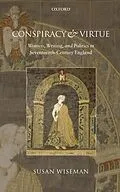What was the relationship between woman and politics in seventeenth-century England? Responding to this question, Conspiracy and Virtue argues that theoretical exclusion of women from the political sphere shaped their relation to it. Rather than producing silence, this exclusion generated rich, complex, and oblique political involvements which this study traces through the writings of both men and women. Pursuing this argument Conspiracy and Virtue engages the main writings on women's relationship to the political sphere including debates on the public sphere and on contract theory. Writers and figures discussed include Elizabeth Avery, Aphra Behn, Anne Bradstreet, Maragret Cavendish, Queen Christina of Sweden, Anne Halkett, Brilliana Harley, Lucy Hutchinson, John Milton, Elizabeth Poole, Sara Wight, and Henry Jessey.
Autorentext
Susan Wiseman is the author of Drama and Politics in the English Civil War and of Aphra Behn. She teaches in the School of English and Humanities at Birkbeck College, University of London.
Inhalt
- Contentions
- Political Rhetorics
- 1: Rhetoric
- 2: Test Cases: Brilliana Harley and Anne Clifford
- Religion and Politics
- 3: The Political Work of a Spiritual Text: Sarah Wight, Henry Jessey and The exceeding Riches of Grace (1647)
- 4: Regicide, Pamphlets, and Political Language: The Case of Elizabeth Poole
- Politics of Genre
- 5: Poetry and Politics: Anne Bradstreet and Lucy Hutchinson
- 6: Rule and Representation: The 'libertine' case of Queen Christina
- Legitimacy and Scandal
- 7: Martyrdom in a Merchant World: Elizabeth Jekyll and Mary Love
- 8: Legitimising Conspiracy: Anne Halkett, Rachel Russell, Aphra Behn
- And So
